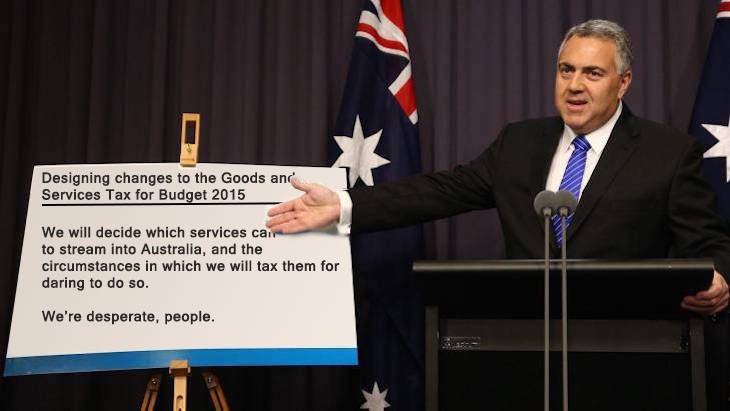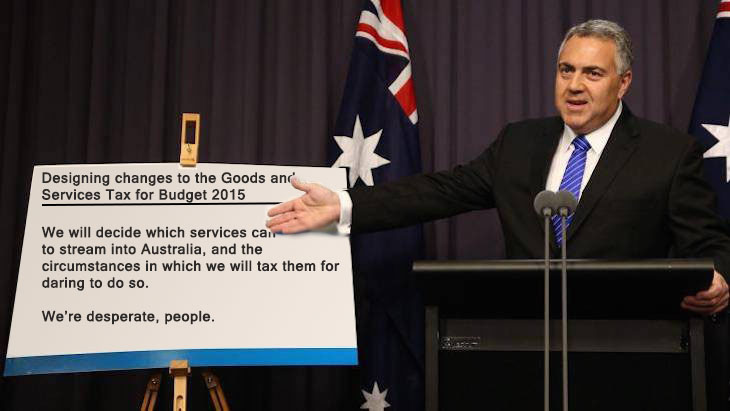
Australian Treasurer Joe Hockey has announced that GST-free imports of goods valued under $1000 will be coming to an end, following a decision of Australia’s Financial Relations Tax Reform Workshop, which counts amongst its members the federal and state treasurers.
According to the release from Treasurer Hockey, GST on import goods will be collected at the point of sale (much like domestic GST) by means of a ‘vendor registration model’. This involves companies such as Amazon and Netflix signing up to collect the 10% fee, and remitting it on a regular basis to the Australian Taxation Office. According to the Sydney Morning Herald, Hockey ‘expected most [vendors] to agree’ to collect the tax.
The decision to begin collection of 10% GST on digital purchases was made earlier this year, however this latest move will see tangible goods included as well. The government has plans to begin collecting GST on online purchases beginning from 22 July 2017, though there is a possibility of bringing this forward if the companies approached to collect the tax are amenable.
It is an interesting approach – theoretically, all retailers of physical goods into Australia will need to register for and collect 10% GST, and as we know from the Australian experience almost 15 years ago, this isn’t a trivial exercise. As any business operator collecting GST can attest, it creates work, and that comes at a cost. A micro-business can probably address its quarterly GST compliance requirements in an hour or two, and that time requirement only increases as the vagaries of GST come into play — input taxed items, GST free items and so on.
One could imagine that while the likes of Amazon and Netflix (to name but two) have systems in place to collect US Sales Tax, they would have to be willing to implement another such system, separately account for it, and set up a mechanism to report and remit to the ATO. One can’t imagine that they’re going to do that out of the kindness of their hearts, and equally, as companies operating outside Australia’s jurisdiction, one wonders exactly what incentive they’d have to actually comply — sign up, or we’ll be very angry at you?
The alternative, if major retailers thumb their collective nose at Australia’s request to collect tax for Australia, is to try and levy the tax on goods actually crossing the border, and that’s problematic for many reasons. Just as in Australia, goods that aren’t sold in the course of trade are generally not subject to GST. What if your family member in the US orders you a book from Amazon as a present? Should that be identified at the border as being from Amazon and GST levied? I’d argue no, but how would Customs know the difference?
It gets even more tricky if Australian consumers make a small effort to circumvent the measures; buy from Amazon, ship to a freight forwarder, who will re-package the parcel in such a way that it doesn’t look like a commercial parcel … how much GST will Australia collect then?
It gets very complicated around this point. If retailers don’t agree, and if customers are savvy, it will fall on Customs to identify parcels that should be subject to GST, levying it, and customers will have to pay those duties before their package is released to them. This might sound simple, but think about what that will actually entail; Customs check very little of what comes into Australia at the moment, because they really don’t have to. Adding this level of compliance will involve many more customs officers, who are not cheap to employ, and almost certainly new mechanisms to try and streamline the process for the end-users. Trying to identify parcels is not always easy, and almost certainly there’ll be GST levied on goods when it shouldn’t, and that looks very bad.
Basically, every way this works out is bad for the consumer, expensive for the retailer (and for the tax-payers), and of questionable value to Australia’s GST revenues in any event. We would suggest, humbly, that the reason people are buying overseas is not to avoid the 10% GST levied in Australia, but more to avoid the significant increase in cost (over and above that 10%) which seems to be pervasive in many product areas.
What do you think about this decision? Will it even pass the Parliament and become law? Will it be effective? Will retailers agree to collect the tax? There’s so many questions. Let us know your thoughts this weekend.



